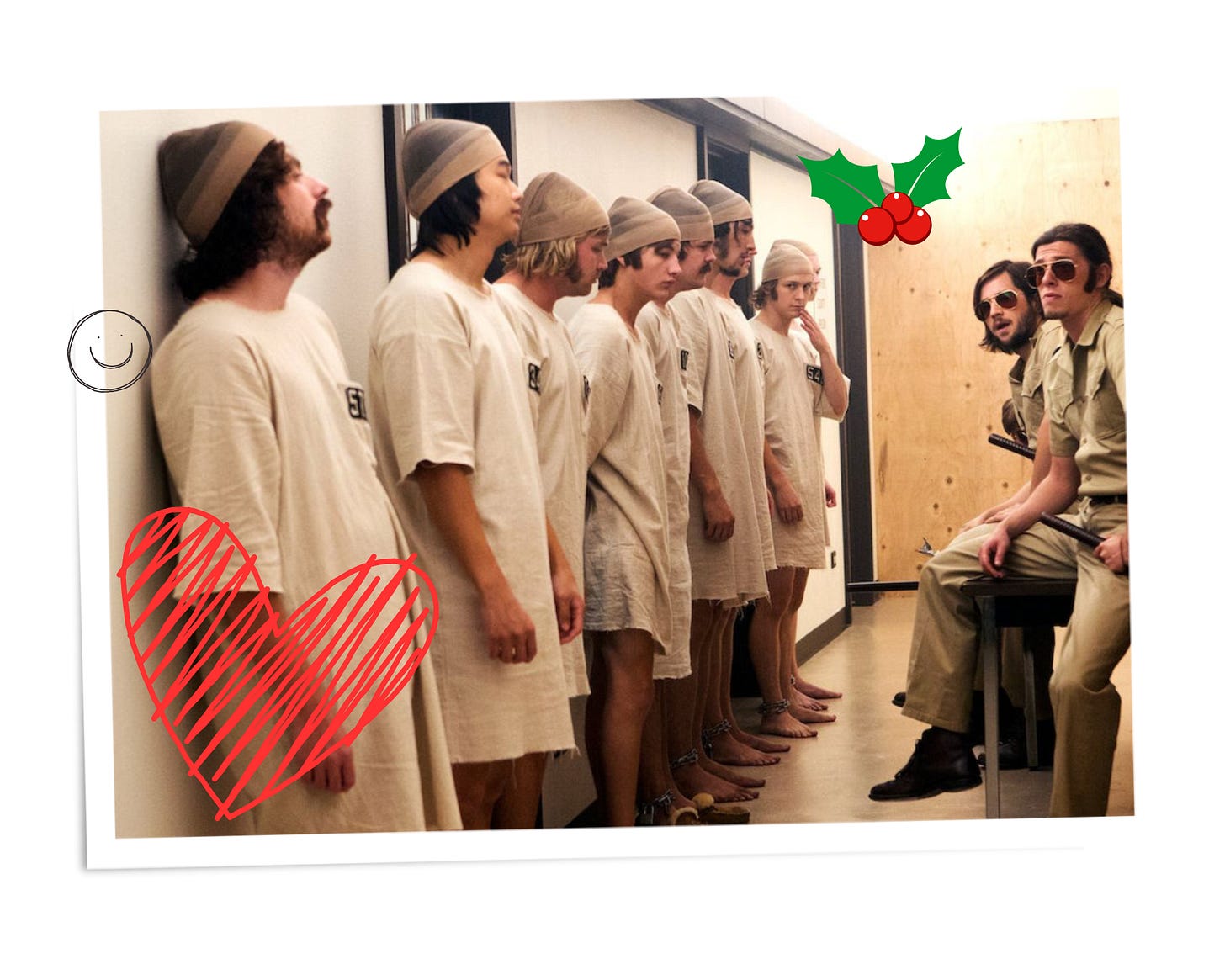A Year-End Ode to Writers Rooms
Our once-pseudonymous TV comedy scribe reveals her real name to extol the return to work
I’m a TV comedy writer who, until now, wrote for The Ankler under the pseudonym Kit Sargent. Previously, I wrote Peak Hustle on the Picket Line, Finding Love on the Picket Lines, a Valentines’s Day Dating Manifesto, a PSA against being a TV writer, Getting Fired the Hollywood Way, The Misery of Writer Twitter, Hollywood’s Zoloft Blow-Off and How to Age Gracefully in Hollywood.
With the WGA and SAG strikes recently finally over, writers are finally back to writers rooms. Or to put it more succinctly…
I have a lot to say about writers rooms, but first things first. I’ve decided to stop writing this column or whatever it’s called, under the pseudonym of Kit Sargent. This is my work, and I should have the courage to stand by it. No one should be embarrassed about getting fired or having mental health challenges or writing a piece telling everyone how important it was to deactivate Twitter before reactivating it three days later. Also, people kept texting saying they knew it was me.
So, yeah, hi. It’s me. My name is Daley Haggar, and I’m a TV writer. At least that’s what it says on the internet.
Now, on to more important matters…
If you’re a regular reader here, you’re probably familiar with my stories about working in writers rooms. Before sharing these stories, I always ask myself two questions. The first is: Have I told this story before? I try not to repeat myself because that’s something old people do, and I don’t want The Guy Who Peed in a Potato Chip Bag on a Dare to become my Corn Pop. The second question is: Is this story funny?
By funny, I mostly mean “funny to me.” Because comedy is subjective and as it turns out, a lot of people don’t find writers room stories funny at all. They find them disturbing. I have a twentysomething relative who works for a corporation that has immiserated millions and funded at least one coup. I recently told this relative a room story — I think it was the one about the EP who used to put Cheetos in my cleavage — and he looked visibly upset. “That’s messed up,” he said. “If someone at HBH War Crimes Holdings pulled that shit, they’d definitely get fired.”
My editor evinced similar confusion during the strike when, amidst all the talk of minimum room size and codifying the room in the MBA, he asked me, “Why would anyone even want to be in a writers room?”
Well, let me tell you!
In Defense of the Writers Room
When I moved to Los Angeles in the early aughts to work in television, I didn’t know what a writers room was. Remember, this was before the internet. I mean, we had the internet, but there wasn’t anything on it. No Substack or social media. The World Wide Web was just a photo of a guy giving himself a blowjob that everyone emailed to each other over and over. I’m also absolutely certain there was a photo of a guy doing a handstand with a miniature fire extinguisher stuck up his ass, even though I can’t find it anywhere, and whenever I bring it up people look at me like I’m some charity case from an Oliver Sacks essay. But I know what I saw.
Back then, there weren’t yet a million articles about how television was made or the people who made it or how to get a job doing it. It was mysterious and exciting. Back then, industry knowledge was passed down person-to-person. You had to know a guy who knew a guy. The first time I got my hands on an actual TV script — an episode of Just Shoot Me — it was magical. It was like finding one of those stashes of Playboy magazines in the woods that I always heard about but never really understood the logistics of. (Who put it there? How many people live close enough to the woods for a distribution network like that to function? Wouldn’t it get wet?)
The first time I heard the term “the room” was in a book called The Showrunners, by the journalist David Wild. He follows around a series of emotionally disturbed people and documents the process of developing a show and getting it on the air. The book was written in the late ’90s. The days of sugar bowls full of cocaine in conference rooms were long gone. Network money was crap now, the interviewees said, and it was only going to get worse. Somehow, the lesson I took from reading this book, a book I still own, a book where Joe Rogan was the sanest person interviewed, was, “This is what I should do with my life.”
I wanted to be in one of those rooms. It sounded cool. Also, if I’m being totally honest, I wanted to annoy men. As my boyfriend at the time said, “Why is it that whenever there’s a group of guys hanging out, there’s always one girl who just has to join in? If me and my friends started a club where we ate burritos, some girl would immediately show up and be like ‘I want to join Burrito Club.’”
I wanted to join Burrito Club.
I didn’t realize that The Showrunners was my Necronomicon, summoning the Old Ones and opening the door to madness and ruin. I didn’t even know what the Necronomicon was because however much women insist on joining Burrito Club, we draw the line at reading H.P. Lovecraft. As recounted previously, I eventually got into a room. Lots of them, because with one major exception, a humiliation I described here, the shows I worked on were all canceled after one season, a common occurrence even back then. The madness and ruin were offset by some pretty good paychecks, but it wasn’t creator-of-Cleghorn! money.
So why? Why, considering everything I’ve just said, would anyone want to be in a writers room? Let’s tick off the reasons:
The Fun
Being a TV writer means having a job where you come in late and get to tell stories all day. About 10 percent of these stories have to do with the show you’re writing; the rest are about things that happened at Ralph’s. Either way, it’s way more fun than the dumb boring newspaper I interned at where they spent all day reporting and writing the dumb boring news. My last few jobs have been in much-maligned “mini rooms,” meaning fewer people, less money and more Zoom. But even those were fun. I really miss the sound of someone eating soup too close to a microphone then getting yelled at by everyone.
The Lingo

Being in a room makes you feel like you’re part of a special club. It’s part of the (see above) Fun. The first time I heard two senior writers argue about whether we should “radio it in” or “just deal with it on the B side” I felt part, I dunno, part of something. Regular slang evolves constantly, but a lot of writers room terms that pre-dated me are still in place today, like chuffa (junk you’ll end up cutting), sweaty (a joke that feels forced) and vomit draft (self-explanatory). Sometimes room slang reaches the level of art, or at least that’s how I feel about “fly chamber.” It’s a reference to the housefly who enters Jeff Goldblum’s teleportation pod in the movie The Fly causing its DNA to co-mingle and transform Goldblum’s character into a hideous monster. It basically means a joke the room loves and refuses to cut that ends up ruining the entire story/script. I can’t tell you how many late-night rewrites I’ve had to sit through because of fly DNA.
Shows that stick around for a while tend to develop their own argot. If you’re really lucky, your name might even become a verb, e.g. “Jeff-ing/You Just Jeffed.” The closest I ever got to being Jeff was an oft-repeated room bit about how somewhere on the internet there was a special message board where all of my ex-therapists came to discuss the trauma they’d experienced. Speaking of which…
The Room Bits
Room bits are one of the best things about being a TV writer. I won’t try to explain any of them here because the whole point of them is that they’re incredibly dumb inside jokes that you deliberately run into the ground until they’re no longer funny, at which point you revive them again just to make people angry. Long before shitposting existed, there were room bits. Some shows even have a Room Guy, which is to say someone who produces little usable script material but excels at room bits. Not sure if they were able to codify his job in the MBA. Maybe next time.
The Bonding

Sometimes this means genuine camaraderie. Other times it means the whole room coming together to hate the star of the show for being a dick. Still other times it means the A-Room and the B-Room turning against one another, Stanford Prison Experiment-style. I vaguely remember someone, probably in a writers room, telling me the whole story of the Stanford Prison Experiment has been debunked, but it’s still a good metaphor. Most of the time, it means your colleagues having your back. Like the time I pulled a box of french fries out of the trash and was about to eat them when another writer screamed “No! We just had those in our underwear!” Which reminds me…
The Food
Even with budgets being slashed, you usually have access to some pretty good food. The bad news is you’ll probably get fat, but it doesn’t really matter because everyone else will be getting fat at the same rate and you won’t have anyone else to compare yourself to so it will seem like nothing’s changed.
Rooms are a Habit-Forming Drug
I just sold a project, but I’d kill to be back in a TV room. The whole writing-screenplays-in-your-pajamas lifestyle… I’m not sure how I feel about it. It’s like stand-up comedy. I’m grateful for the people who do it, but they’re even more screwed up than us.
Oh and one other thing…
Rooms Have Changed
If writers rooms still operated the same way they did when I first started out, I might feel differently, but rooms have gotten more diverse and way less insane. Some people, largely white middle-aged guys, think the culture has shifted too far in the other direction. I won’t relitigate that one right now — although I don’t get why we had to get rid of the term “gang-bang” for group-writing a script. What’s wrong with a good gang-bang? No kink-shame. I think the focus on the culture shift was, as is often the case, a distraction from the real problem, which is the economic shift. A shift that culminated in a strike. Going forward, I think rooms will be smaller and jobs harder to come by, not because of the strike but because of the trends that lead to it. And that’s too bad, because for all of my jokes about writers and the fact that most of them belong in prison, it really is one of the coolest jobs in the world.
As for my editor, he remains, and I’m quoting directly, “unconvinced that any of this sounds fun.”
One more thing: I feel like this piece needs a better blow, so go ahead and write your alts in the margin. We’ll deal with it after lunch.







Hey Daley. I’ve very much enjoyed reading these pieces — moreso now that you’ve unveiled and I recognize part of their source in our shared experiences.